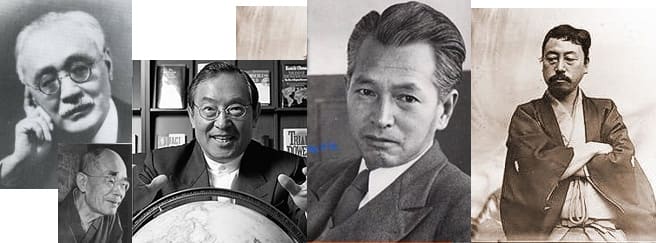★☆No.50 “Global Japanese – The Role Models of Autonomous and Independent Japanese”☆★
This article deals with an appropriate image of a future Japanese.
From three viewpoints of knowledge, skill and attitude, five necessary conditions are required to discipline Japanese themselves who can work globally.
First is “Mastering knowledge is supposed to follow an information processing system.”
Second is “Be familiar with Critical Thinking/Writing.”
Third is “Enhancing English proficiency is critical, particularly speaking and debating.”
Fourth is “Be Assertive, not submissive.”
And
Last is “Ethnorelativism is one of the effective ways to commune with cross cultures and to prevail upon ethnocentric Japanese.”
Each explication is as follows:
1. An information processing system comprises three elements: input, process/analysis and output. Wrong inputs of information lead to tortuous results (outputs). Particularly, Japanese tend to receive imported information without criticism and examination. In case Japanese do not think critically, the stage of process and analysis is inappropriate to understand and analyze things.
Accordingly, collecting correct and appropriate information is critical through English writing not only via Japanese literature.
2. Critical Thinking/Writing is a Western standardized way to deal with things since Socrates. On the other hand, a traditional Japanese way of thinking including spiritualism with which materials can be controlled has not been effective in a real business society. At the same time, strategic viewpoints are expected to do better business.
3. According to IELTS, International English Language Testing System conducted by The Commonwealth of Nations encompassing the UK, Canada and Australia, Japan was ranked number 15 out of 20 non-English native countries in 2005. Besides evaluating humility higher, Japanese are in one of higher context societies where information is delivered worldwide and quite an implicit society. This was advocated by Edward T. Hall in 1955 and beneficial even now.
Western societies sympathize with explicit expression, not implicit words saying that “Silence is Gold”, the famous proverb in Japan.
Thus, Japanese are supposed to express clear, precise and understandable ideas by mastering debate and speaking globally.
4. Japanese are seemingly submissive and underline the image of modesty and humility, obeying Wa (harmony) both in a workplace and at home. Humility easily tends to submissiveness. To avoid this misunderstanding, such an attitude as assertive persons may be needed. Many Japanese behave with obsequious otherwise haughty manners.
Submissive attitude is one of the solutions to deviate from a servile and arrogant posture.
5. Learning Ethnorelativism will open Japanese eye to what cross cultural societies are. Ethnocentrism is based on the ideas and beliefs of one particular culture, race or group and using these to judge other cultures. On the other hand, Ethnorelativism that has been developed since Giambattista Vico is to accept other cultures by recognizing that one particular culture is one of many other ideas and beliefs in the world. With ethnorelativism, we can empathize with other cultures, being able to come in and go out of cross cultural societies.
Photos above who are global Japanese as a mentor :
from left above,
Inazo Nitobe (1862-1933), Educator, author of Bushido: The Soul of Japan(1900).
Daisetsu Suzuki (1870-1966), author of books and essays on Zen and Buddhism.
Kenichi Ohmae (1943-), business and corporate strategist, author of The Borderless World.
Jiro Shirasu (1902-1985), a brain truster of Prime Minister Shigeru Yoshida, bureaucrat and business person.
Tenshin Okakura (1862-1913), 1st Dean of the Tokyo Fine Arts School (now the Tokyo National University of Fine Arts and Music), author of The Book of Tea.
★Japanese Ver.
















